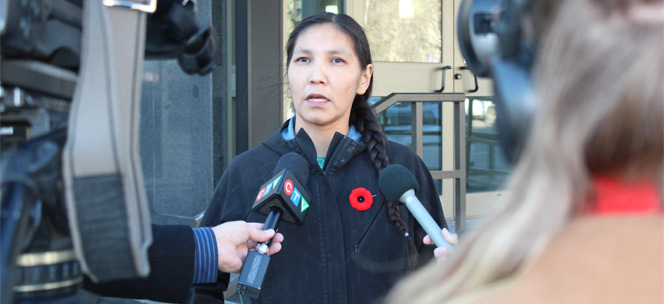Are First Nations leaders obligated to provide transparency?

Charmaine Stick is preparing for a trip. She’ll leave her kids with a babysitter and drive six hours from the Onion Lake Cree Nation to Regina. She’s not catching a concert or going to the spa. She’s going to a courtroom to hear lawyers argue over a question she raised: Do First Nations leaders have an obligation to publish basic financial documents such as their salaries and the band’s audited financial statements? (Photo: Charmaine Stick in front of Regina Courthouse)
This legal question is personal for Ms. Stick. Onion Lake has energy resources in addition to government funding, but band members are often told there’s no money to pay for housing repairs or travel expenses for medical appointments. Ms. Stick has raised repeated questions about the band’s money and went on a 13-day hunger strike to demand transparency.
Ms. Stick is now partnering with the Canadian Taxpayers Federation to launch a court application to compel Onion Lake’s leaders to provide transparency. Her lawyer will argue The First Nations Financial Transparency Act specifically requires accountability and that there’s a basic responsibility all leaders have to provide transparency.
In a separate legal action, Onion Lake’s leaders have challenged The First Nations Financial Transparency Act as unconstitutional even though virtually every other government in Canada routinely publishes basic financial information.
Onion Lake’s lawyers are now arguing Ms. Stick’s application should be stayed until the constitutional issue is addressed. In other words, regardless of the validity of the challenge or the years it may take to resolve, they argue that Ms. Stick’s shouldn’t be able to go forward with her application until the constitutional ruling is rendered.
Ms. Stick’s court application was scheduled for Feb. 10, 2017, but Onion Lake’s lawyers asked for an adjournment to prepare for the potentially precedent-setting case.
In the meantime, the federal government has left a legal void.
Indigenous and Norther Affairs Minister Carolyn Bennett announced the government would no longer enforce The First Nations Financial Transparency Act on Dec. 18, 2015, but she also made a promise: “We will work in full partnership with First Nations leadership and organizations on the way forward to improve accountability and transparency.”
The Canadian Taxpayers Federation filed an access-to-information request to check on that work. The response showed the government did virtually nothing for six months beyond developing a consultation plan for the fall of 2016. A second access-to-information request showed the consultation never happened.
The impact of this inaction has been immediate. National Post reporter David Akin revealed 92 per cent of First Nations complied with the act in 2015. In 2016, that number fell to 85 per cent.
While Minister Bennett has done nothing to keep her promise, she’s delivered a repetitive refrain in Parliament.
“We all want accountability – we just cannot do it top-down.,” said Minister Bennett on Apr. 11, 2016. She repeated that message on Nov. 14, 2016: “Everyone, including First Nations governments, wants increased transparency and accountability. However, we will only achieve this by working in full partnership with First Nations leaders and organizations.”
Minister Bennett misses the irony in opposing a top-down approach while only committing to engage with leaders and organizations and failing to do even that.
“She should be talking to the grassroots people,” said Ms. Stick in response. “She needs to go beyond our leaders because our leaders most often don’t work for us.”
Ms. Stick remains ready to make her trip to the Regina courtroom. Lawyers on both sides are preparing for each other’s arguments as well as those that may be raised by federal lawyers who are likely to appear as interveners. The stakes are high: If Ms. Stick wins she’ll set a precedent that grassroots First Nations people have a right to know what’s happening with their communities’ money and that right cannot be delayed by endless constitutional wrangling.